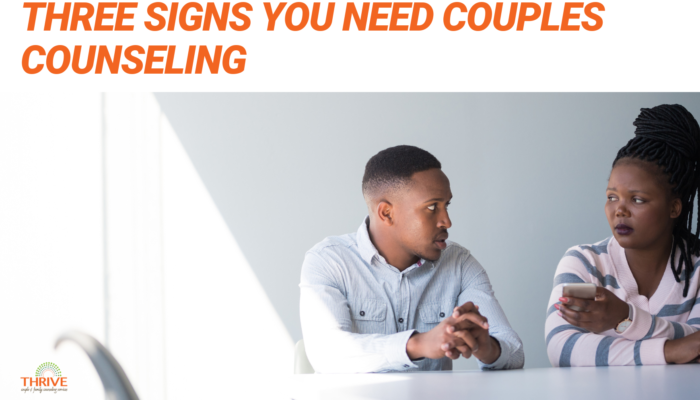How do I know if we need Couples Counseling?
At some point in a committed relationship, many people may find themselves wondering: “How do I know we need couples counseling?” This is an excellent question, and I think it should be asked more often. Here are some important warning signs you need couples therapy. See if one of these resonates with you.
1. You need couples counseling when you are in individual therapy AND the majority of the time in therapy is spent talking about your relationship.
As a therapist trained in a systemic approach towards treatment, I believe that change happens quicker when we work with the system—in this case, you and your partner. When someone comes into individual therapy to work on relationship concerns, couples therapy is not the only way to make progress, but it may be the best way.
Perhaps your reason for seeking therapy had more to do with individual challenges such as anxiety or depression. Research indicates that symptoms of PTSD, anxiety or depression decrease using Emotionally Focused Therapy. Moreover, regardless of whether or not your personal concerns are fully resolved in individual therapy, involving your spouse to help you deal with issues such as depression or anxiety simply makes sense.
Your symptoms impact your partner, and can cause them to respond to you in a certain way. Unfortunately, the way partners sometimes respond to the person struggling can increase symptoms. For example, if John struggles with anxiety and his partner Rob tells him he should “just move on” in an irritated way, John’s anxiety is likely to skyrocket. He might feel invalidated and beat himself up, and then have worries about Rob’s feelings for him too!
Therefore, no matter how much individual therapy you get, a certain degree of change is impossible unless you and your partner strengthen the relationship. Moreover, I do think that couples (or family) therapy can create more long lasting results and changes. If you are seeing an individual therapist, continue to do so; however, ask him/her for referrals for a couple’s therapist and start your own systems work today.
2. You need couples counseling when you start recognizing these warning signs described in John Gottman’s book “Why Marriages Succeed or Fail: And How You Can Make Yours Last”:
o Blaming the other person
o Attacking the other partner’s character
o Criticizing
o Being persistently angry and resentful
o Name calling and mocking
o Using sarcasm and hostile humor
o Giving the other person the silent treatment or physically removing yourself from arguments
o Ignoring and withdrawing emotionally and physically.
3. You need couples counseling when you and your partner are going through stressful life events and it feels like your relationship is straining.
Examples of some of these events are:
o Losing a job
o The birth of a child
o Going through a natural disaster or other trauma
o Children leaving home
o Getting married; Getting seriously ill
o Raising a disabled or a difficult child
o Addiction
What do the couples counseling experts say?
Brent Bradley and James Furrow in their book “Emotionally Focused Couple Therapy for Dummies” proposed that you ask yourself and your partner the following questions:
o Which of Gottman’s warning signs are occurring in our relationship?
o Have these warning signs increased in number and intensity?
o Have we experienced or are we experiencing one or more of the listed life events?
Did you know that John Gottman discovered that an average couple waits 6 years before starting couples therapy after they begin to have problems? You can imagine that the longer one waits for couples counseling, the more warning signs there might be, and the greater the likelihood for the relationship to fail.
Don’t be one of these couples. Don’t wait years before seeking help! Increase your chances of having a satisfying and loving relationship. Seek help as soon as you are experiencing these warning signs, or if you start noticing the stressful life events straining your relationship.
Want to keep learning how couples therapy can protect your relationship?
Sign up for our newsletter and to make sure you don’t miss any of our blog posts.




